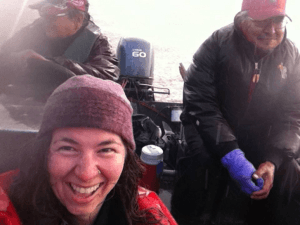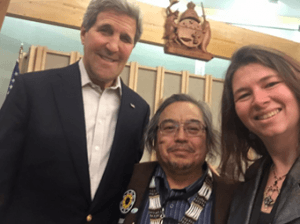If you’re looking for geography professor Dr. Annette Watson, you’ll have to search anywhere from the salmon-filled Yukon River in Alaska to the banks of the marshy Stono River near Charleston. If you’re on campus you might find her in the political science building or over in SSMB where she fulfills her role as the Director of the Master of Environmental Studies (MES) program. She was drawn to the College when she interviewed here in 2008. “When I got here for my interview people were amazing and obviously the campus is just gorgeous, and I liked the kind of working relationships that I could have here,” Watson said.
 She was also drawn to the Lowcountry because of the opportunities she had for fieldwork, something that she even incorporates into a course called Reading the Lowcountry Landscape. “Anywhere that I live, I believe in doing local-based fieldwork,” Watson explained. “This place is very interesting in terms of its diversity of people and certainly the Gullah Geechee communities are of absolute interest to me. I didn’t even know about them before I got here.”
She was also drawn to the Lowcountry because of the opportunities she had for fieldwork, something that she even incorporates into a course called Reading the Lowcountry Landscape. “Anywhere that I live, I believe in doing local-based fieldwork,” Watson explained. “This place is very interesting in terms of its diversity of people and certainly the Gullah Geechee communities are of absolute interest to me. I didn’t even know about them before I got here.”
Throughout her time at CofC, Watson has done research with various groups of people, both in the Lowcountry and along the Yukon River in Alaska. She says that the initial stages of getting to know people are both the most challenging and most rewarding parts of the process. “You have to spend time talking to people and understanding and learning their perspectives. I’ve done plenty of fishing with people both here in the Lowcountry and in Alaska. I try to work alongside them for a time to try to get that insight or perspective, or at least identify a perspective in which I can communicate what it is they want other people to know.”
Before beginning her research, Watson didn’t even know how to fish. She learned all of her “outdoorsy” skills in the field, including camping and how to build a fire. She always tells students who want to do fieldwork that they should, “always be prepared by knowing how to start a fire. It is a real skill outside of the United States.”
 Her new skill of fishing, coupled with being invited to new villages and communities to further her knowledge, have been among her favorite experiences. “I learned how to think about nature in a way that I never did as a person growing up in a suburb. That outsider perspective actually helps to focus and sharpen what it is I’m learning.”
Her new skill of fishing, coupled with being invited to new villages and communities to further her knowledge, have been among her favorite experiences. “I learned how to think about nature in a way that I never did as a person growing up in a suburb. That outsider perspective actually helps to focus and sharpen what it is I’m learning.”
Given her suburban childhood, you may be surprised to learn that Watson built her own house in Alaska, using Google and YouTube. “I built a cabin by myself with my own hands with help from only a couple of people to lift the walls. That’s what I did during my sabbatical: I built myself a house that I could live in.”
One of her recent projects has been with the Arctic Council, working on an indigenous-led project to develop a fisheries assessment. She originally became involved with the group after spending six seasons with their chief, salmon fishing on the Yukon River.
After those seasons—sixteen hours a day being out on the river, cold and wet—the chief began talking about the Arctic Council and asked Watson to help develop a project. The goal of the project is to design a fisheries assessment from the perspective of indigenous peoples. “We want to think through what it means to be ‘salmon people,’ the people who rely on the salmon, and not just think of the salmon as unrelated to the human communities that it shares the rivers with,” Watson explained.
Her directorship of the MES program here on campus means that often times she finds herself teaching only one undergraduate class per semester. However, she stays involved with students through a variety of independent study  projects. “Currently I’m working with an honors student on his bachelor’s essay doing ethnobiology. He’s working on a project that is hopefully going to create a permanent garden installation over by the Stono River where the College has property. We’re calling it the Hidden Hands Garden, meaning the hidden labors and hidden knowledge of all the former agriculturalists in the area—especially the folks that were enslaved on these plantations brought over from Africa, who used their indigenous traditions and a whole host of knowledge about plants and techniques to do sustainable agriculture.” There will be a groundbreaking for the garden at the end of the month and the goal is that it would become a teaching installation not only for CofC students but for visiting K-12 schools as well.
projects. “Currently I’m working with an honors student on his bachelor’s essay doing ethnobiology. He’s working on a project that is hopefully going to create a permanent garden installation over by the Stono River where the College has property. We’re calling it the Hidden Hands Garden, meaning the hidden labors and hidden knowledge of all the former agriculturalists in the area—especially the folks that were enslaved on these plantations brought over from Africa, who used their indigenous traditions and a whole host of knowledge about plants and techniques to do sustainable agriculture.” There will be a groundbreaking for the garden at the end of the month and the goal is that it would become a teaching installation not only for CofC students but for visiting K-12 schools as well.
Though she doesn’t spend as much time in the classroom as she used to, Watson’s philosophy on teaching is: “Let’s just get excited about what the possibilities are to change the world.” She teaches mostly online classes now, including Reading the Lowcountry Landscape in which she teaches students about local fieldwork. “The classroom is literally the Lowcountry, that’s an exciting way to think about teaching,” Watson said.
Her experience at the College of Charleston has been diverse: research, teaching, and administration. Beyond learning how to build a fire, her advice to current undergraduates is simple: “Find the right balance of being kind to yourself, while pushing yourself to do better.”
Interested in learning more about Dr. Watson’s work? Check out the geography minor at CofC, the Master of Environmental Studies program, and the Arctic Council.
